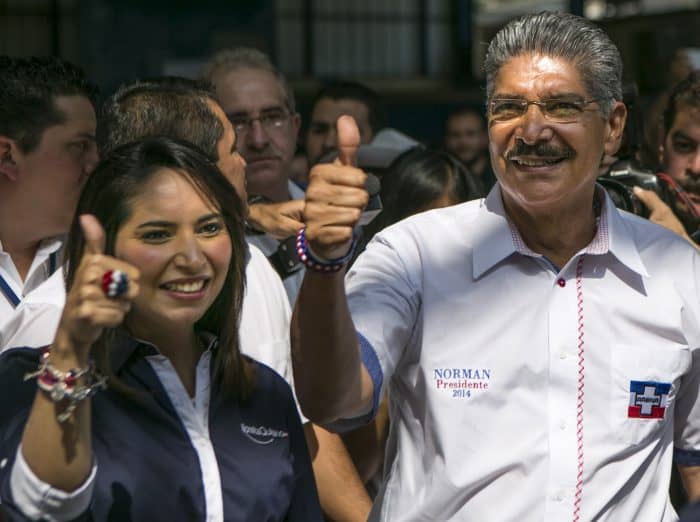SAN SALVADOR – The parties of both candidates in El Salvador’s surprisingly tight presidential runoff clash claimed victory late Sunday.
Pre-election polls indicated that ex-guerrilla leader Salvador Sánchez Cerén of the Farabundo Martí National Liberation Front (FMLN) would easily defeat Norman Quijano with the conservative ARENA party.
But with all of the returns tallied, the leftist candidate was leading by a tiny margin: 50.11 percent to 49.98, electoral authorities reported.
“We won the first round and now we have triumphed again in the runoff,” Sánchez Cerén told enthusiastic supporters amid an explosion of fireworks.
But his ARENA counterpart was convinced its side had won.
Quijano claimed victory in a speech to supporters, and insisted that he would not allow “fraud of the Chavista or [Nicolás] Maduro style like in Venezuela.”
He claimed that El Salvador’s military was “aware of the fraud that is being perpetrated” by election authorities along with the FMLN.
Sánchez Cerén had conciliatory words for his rival.
“We can say right now that you have the doors open to work with us to move El Salvador forward,” he said.
Election officials, likely expecting that vote results will be challenged and there will be calls for a recount, urged both sides to wait for final results.
“This tribunal recommends and orders that no party declare itself winner given such close results,” said Supreme Electoral Tribunal president Eugenio Chicas in a TV and radio message.

Teacher, rebel, vice president
Sánchez Cerén, 69, is El Salvador’s vice president. A former teacher and ex-education minister, he was one of five top guerrilla commanders during El Salvador’s bitter 1979-92 civil war, which pitted the FMLN against the U.S.-backed conservative government.
Conservatives were in power for two decades until 2009, when Salvadorans elected FMLN candidate Mauricio Funes, a former journalist, as their first leftist president.
The FMLN fell just shy of an outright victory in a first round vote last month, and Sánchez Cerén was expected to easily win the runoff vote.
Meanwhile Quijano, 67, the mayor of the capital city San Salvador, is a law and order candidate who campaigned on the country’s high crime rate and the notorious “mara” street gangs behind much of El Salvador’s drug dealing and extortion.
After the first-round vote, Quijano overhauled his image and talked more about keeping children out of gangs and rehabilitating those already ensnared by them.
Quijano however suffered from his links to ex-president Francisco Flores, a former campaign adviser, under scrutiny over $10 million donated by Taiwan that went missing during his 1999-2004 government.
ARENA removed Flores from his advisory job, but the controversy has damaged Quijano.
A civil war legacy
After the civil war, El Salvador found itself facing violence from the street gangs, which control whole neighborhoods and run drug distribution and extortion rackets.
Homicides were running at 14 per day until a truce was reached between the two main gangs in March 2012, which helped to halve the murder rate. But extortion and other crimes persist.
The maras are believed have around 60,000 members, 10,000 of whom are behind bars.
Sánchez Cerén wants to rehabilitate former gang members, but said he would fight those who refuse to give up street life.
Whoever wins and takes office on June 1 will face a shaky economy.
Forty percent of El Salvador’s six million people live in poverty, and the country relies heavily on remittances sent by Salvadorans living abroad — around $4 billion a year, or 16 percent of the country’s GDP.
Sánchez Cerén vows to spend more money on social programs which he said he would finance via a “progressive fiscal policy.”
“The main thing is to use those funds honestly,” he has said.






